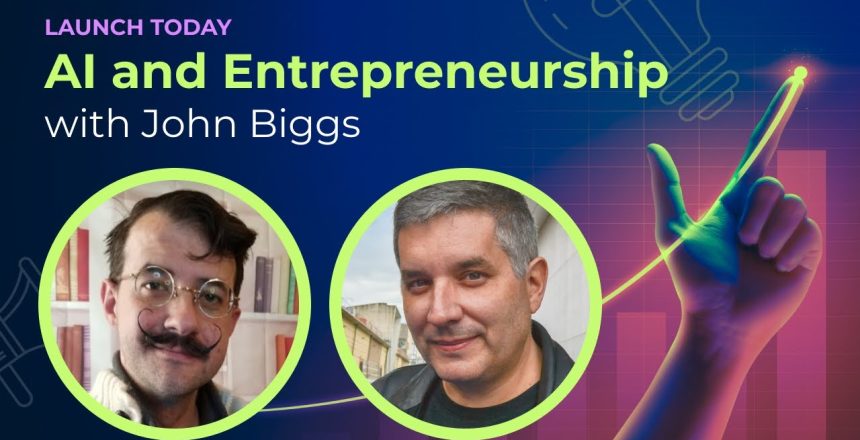Most startups fail, but some make it. They hit $1 million in revenue. They break through. What’s their secret?
John Biggs knows. He’s seen it all: twenty years in tech, as a journalist and entrepreneur, and startups rising and falling like empires.
Biggs laid it bare on the Launch Today podcast. Pay attention if you’re building a startup and want to hit seven figures.
The game has changed, and the rules are different. What worked yesterday won’t work tomorrow. Biggs knows this, and he’s living it.
In this article, we’re going to rip apart his advice. We’ll dissect what works. We’ll expose what doesn’t. We’ll show you how to survive in a world where most startups die.
Ready? Let’s go. It’s time to learn how real startups make real money.
The Changing Tech Landscape
The tech world has undergone a seismic shift in the past two decades. John Biggs recalls a time between 2004 and 2014 when predicting the next big thing in technology was relatively straightforward. Innovations like Uber and the iPhone were clearly poised for success based on market trends and consumer needs. However, this clarity began to dissipate around 2014.
The period following 2014 saw an influx of what Biggs terms “noise” in the tech industry. Cryptocurrencies, ICOs, and NFTs dominated headlines, often overshadowing more substantial technological advancements. This noise made it increasingly difficult for truly innovative startups to gain traction and attention.
Fast forward to the present day, and we’re witnessing another paradigm shift, this time driven by artificial intelligence. Biggs views AI as a transformative force, likening it to a “motorcycle of the mind” that expands human capabilities in ways previously unimaginable. This new era presents both opportunities and challenges for startups.
What Startups Should Focus On in 2024
The most promising startups in the coming years will be those that skillfully blend human expertise with AI capabilities. It’s not about replacing humans with AI, but rather finding the sweet spot where both can work together synergistically.
Startups that succeed will focus on using technology to push the boundaries of human ability and consciousness. This doesn’t mean creating a science fiction utopia, but rather developing practical applications that allow people to learn, work, and create more effectively.
In a world of ever-increasing technological complexity, there’s immense value in simplification. Startups that can strip away unnecessary complications and reveal the “magic” of technology to users will find themselves at a significant advantage.
Common Pitfalls for Modern Startups
While AI is a powerful tool, Biggs warns against startups that depend too heavily on it without human oversight. He cites examples of AI-generated content that, while prolific, lacks the nuance and understanding that human creators bring to the table.
Many founders believe that securing venture capital funding is the key to success. However, Biggs argues that this mindset often leads to premature scaling and a lack of focus on building a sustainable business model.
Founders who lack a deep understanding of their product’s technical aspects often find themselves at a disadvantage. This doesn’t mean every founder needs to be a coding expert, but a basic grasp of the technology underpinning their startup is crucial.
Keys to Startup Success
One of Biggs’ most emphatic points is the importance of generating revenue as quickly as possible. Gone are the days when startups could afford to focus solely on user acquisition without a clear path to monetization.
The ability to quickly build and iterate on a Minimum Viable Product (MVP) is more important than ever. This allows startups to test their ideas in the real world and make necessary adjustments before committing too many resources.
Even if a founder isn’t personally writing code, they need to have a comprehensive understanding of their product. This knowledge is crucial for effective decision-making and for avoiding potential pitfalls in development and scaling.
While outsourcing can be a valuable strategy for startups, Biggs warns of the dangers of relying too heavily on external developers without proper oversight. He shares cautionary tales of founders who were left in the lurch by unscrupulous or incompetent outsourced teams.
Navigating Failure and Maintaining Mental Health
The harsh reality is that most startups fail. However, Biggs encourages founders to view these setbacks not as endpoints, but as stepping stones to future success. Each failure builds a foundation of knowledge and experience that can be invaluable in future ventures.
Running a startup is an emotional rollercoaster. Founders often face constant rejection and setbacks, which can take a severe toll on mental health. Biggs emphasizes the importance of acknowledging these challenges and seeking help when needed.
Successful entrepreneurs develop a thick skin and the ability to bounce back from disappointments. This resilience is often what separates those who eventually succeed from those who give up.
Practical Advice for Aspiring Founders
The most successful startups are born from a deep understanding of a specific problem. Founders should focus on issues they have personal experience with or have researched extensively.
While it’s tempting to jump on the latest tech bandwagon, Biggs advises against building startups around fleeting trends. Instead, focus on creating lasting value in a specific niche or industry.
Before seeking investment or even building a product, founders should immerse themselves in their chosen industry. This knowledge will be invaluable when making crucial decisions and pitching to potential investors or customers.
Harnessing AI in Your Startup
Artificial intelligence should be viewed as a powerful tool to augment human capabilities, not as a replacement for human expertise. The most successful startups will find ways to combine AI efficiency with human creativity and insight.
AI has the potential to democratize certain aspects of business, particularly in areas like writing and coding. This presents opportunities for startups to compete with larger, more established companies on a more equal footing.
Just as “greenwashing” became a problem in environmental marketing, Biggs warns of the rise of “AI washing” – companies claiming AI capabilities without substance. Startups should be honest about their use of AI and focus on its practical applications rather than using it as a buzzword.
Conclusion
The journey to building a successful startup and reaching that first million in revenue is challenging, but not impossible. By focusing on creating real value, understanding your product deeply, and using tools like AI judiciously, early-stage founders can position themselves for success in an ever-changing technological landscape.
Remember, the path to startup success is rarely linear. It requires grit, adaptability, and a willingness to learn from both successes and failures. As John Biggs’ insights reveal, the most successful founders are those who stay grounded in reality while pushing the boundaries of what’s possible with technology.
In the end, building a startup is about more than just making money – it’s about solving problems, creating value, and potentially changing the world. With the right mindset and approach, your startup could be the next to break through to that coveted million-dollar milestone and beyond.



